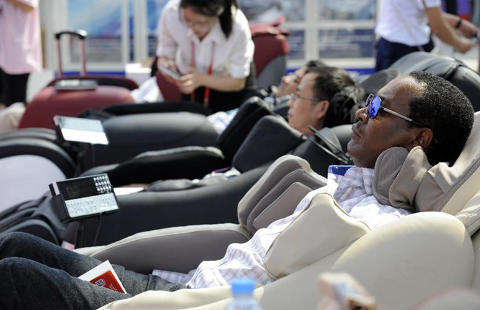Slower growth likely in 2015
(Agencies) Updated: 2014-10-18 09:58Former US treasury secretary Lawrence Summers, now a Harvard University professor, and colleague Lant Pritchett argue China is unlikely to sustain its rapid growth over the next 20 years as a "regression to the mean" damps its expansion.
"Many of the great economic forecasting errors of the past half century came from excessive extrapolation of recent performance and treating a country's growth rate as a permanent characteristic rather than a transient condition," they wrote in a paper.
Applying regressions, the predicted growth rate for China over the next two decades drops to 3.9 percent, they wrote in the paper, which also argues India's expansion is likely to slow.
The International Monetary Fund in July urged China to set a growth target of 6.5 percent to 7 percent for 2015, warning of a "web of vulnerabilities" in the economy from real estate and rising debt. This month, it forecast 7.4 percent GDP growth this year and 7.1 percent in 2015.
"Lowering the growth target to about 7 percent will provide more room for reform," said Zhu Haibin, chief China economist at JPMorgan Chase &Co in Hong Kong.
"Reforms and economic rebalancing will cause traditional overcapacity industries to slow down, but it will take time for new sectors to grow. It will be reasonable to lower the growth target."
President Xi Jinping said in May that the nation needs to adapt to a "new normal" in the pace of growth.
China has taken steps away from its addiction to GDP targeting, with the creation of a dashboard of more than 40 economic indicators to measure the efficiency and quality of growth.
The set will comprise existing data such as GDP and new items including the ratio of fiscal debt to revenue and the proportion of workers involved in research and development, the National Bureau of Statistics said last month.
In the long run, "China should give up targeting GDP completely and instead focus on employment and inflation, given how difficult it is to determine what the sustainable level of GDP growth actually is," said Julian Evans-Pritchard, China economist for Capital Economics Ltd in Singapore.
That echoes the view of Standard &Poor's Singapore-based economists Paul Gruenwald and Vincent Conti, who last month said China's adherence to targeting is hurting financial stability.
Shen Jianguang, chief Asia economist at Mizuho Securities Asia Ltd in Hong Kong, said while the government's growth target "is no longer taken as the golden rule" it is still "necessary for economic planning and policy adjustments".
|
 |
 |
| Weak inflation makes more room for policy change | China's September PPI down 1.8% |
- China's business registrations surge
- IMF official: Growth slowdown welcome
- A tick for graft fight, but much more is needed
- Chinese economy to pick up in Q4
- China needs no "big stimulus" despite slowdown
- Size matters, but so does how it is calculated
- China is a driving force for world economic recovery
- Slower growth likely in 2015
- Iron ore imports poised for 15% growth
- Nobel laureate to help drive Baiyunshan's 'golden spear'
- Video: Why I line up for new iPhones?
- Retail fuel rates reduced after global crude falls
- Fans spend hours in line for iPhones
- China maintains minimum wheat purchase price
- Hedge funds wait for green signal to ride 'through train'
















